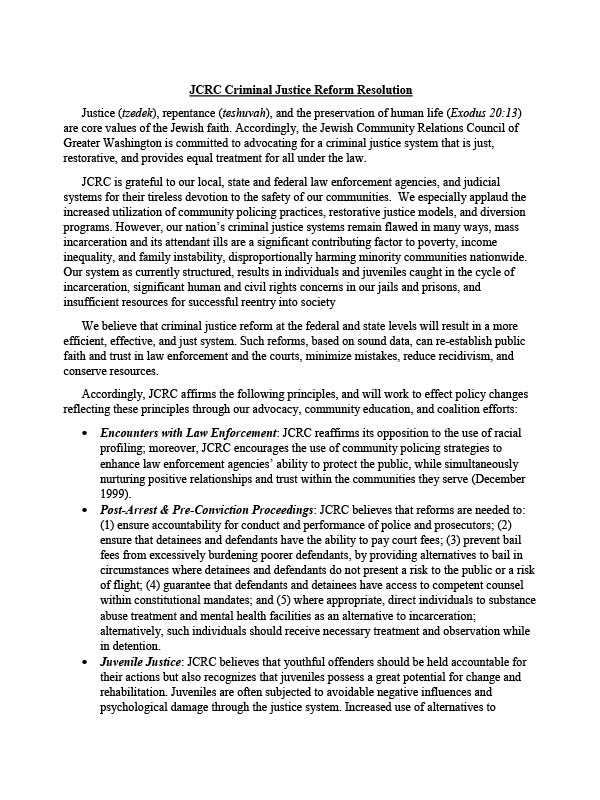Policy Resolution
September 13, 2017
Justice (tzedek), repentance (teshuvah), and the preservation of human life (Exodus 20:13) are core values of the Jewish faith. Accordingly, the Jewish Community Relations Council of Greater Washington is committed to advocating for a criminal justice system that is just, restorative, and provides equal treatment for all under the law.
JCRC is grateful to our local, state and federal law enforcement agencies, and judicial systems for their tireless devotion to the safety of our communities. We especially applaud the increased utilization of community policing practices, restorative justice models, and diversion programs. However, our nation’s criminal justice systems remain flawed in many ways, mass incarceration and its attendant ills are a significant contributing factor to poverty, income inequality, and family instability, disproportionally harming minority communities nationwide. Our system as currently structured, results in individuals and juveniles caught in the cycle of incarceration, significant human and civil rights concerns in our jails and prisons, and insufficient resources for successful reentry into society.
We believe that criminal justice reform at the federal and state levels will result in a more efficient, effective, and just system. Such reforms, based on sound data, can re-establish public faith and trust in law enforcement and the courts, minimize mistakes, reduce recidivism, and conserve resources.
Accordingly, JCRC affirms the following principles, and will work to effect policy changes reflecting these principles through our advocacy, community education, and coalition efforts:
- Encounters with Law Enforcement: JCRC reaffirms its opposition to the use of racial profiling; moreover, JCRC encourages the use of community policing strategies to enhance law enforcement agencies’ ability to protect the public, while simultaneously nurturing positive relationships and trust within the communities they serve (December 1999).
- Post-Arrest & Pre-Conviction Proceedings: JCRC believes that reforms are needed to: (1) ensure accountability for conduct and performance of police and prosecutors; (2) ensure that detainees and defendants have the ability to pay court fees; (3) prevent bail fees from excessively burdening poorer defendants, by providing alternatives to bail in circumstances where detainees and defendants do not present a risk to the public or a risk of flight; (4) guarantee that defendants and detainees have access to competent counsel within constitutional mandates; and (5) where appropriate, direct individuals to substance abuse treatment and mental health facilities as an alternative to incarceration; alternatively, such individuals should receive necessary treatment and observation while in detention.
- Juvenile Justice: JCRC believes that youthful offenders should be held accountable for their actions but also recognizes that juveniles possess a great potential for change and rehabilitation. Juveniles are often subjected to avoidable negative influences and psychological damage through the justice system. Increased use of alternatives to incarceration and other community programs may enhance the likelihood that youth will grow into responsible productive adults and escape the cycle of incarceration.
- Sentencing: JCRC believes that judicial discretion, rather than mandatory minimum sentencing rules, is necessary to ensure that sentences are tailored to the particular defendant and crime. Mandatory minimum sentences for minor offenses have removed large numbers of people from productive engagement in their communities and contributed to an overcrowded prison system nationwide at great taxpayer expense. Furthermore, wherever possible, alternatives to incarceration, such as community program diversion, electronic monitoring, drug courts, mandatory drug counseling, and other types of treatment for mental health issues, should be used more frequently. Such alternatives will better assist these individuals to become productive members of society, which in turn will result in more citizens paying taxes victim restitution and child support. JCRC also reaffirms our opposition to capital punishment in all cases (February 1975).
- Incarceration: JCRC believes that conditions of confinement must be humane and that certain conditions, including serious overcrowding, pervasive physical and sexual violence, and overuse of solitary confinement, can impose dire consequences more egregious than the sentences themselves. Further, lack of adequate rehabilitation programming, medical and mental health services, substance abuse treatment, educational opportunities, and family contact tragically result in individuals who often are unprepared for productive participation in society upon release.
- Reentry: JCRC believes that adequate funding for and increased access to reentry and parole programs can assist the successful reintegration of former prisoners, foster public safety by reducing recidivism, and promote responsible citizenship. Reentry planning should include restoration of voting rights for felons who have completed their sentences, educational programs, job training, and access to medical and mental health care, including substance abuse treatment, to reduce recidivism. Additionally, employment practices that discriminate against former inmates without compelling justification, and denial of former inmates’ access to public assistance, food stamps, subsidized housing, professional licensure, student loans, and other government programs is short-sighted and counterproductive to integrating these individuals back into society once they have served their sentences. Reentry reform should also involve review of other statutory and regulatory burdens that make reentry difficult. For example, facially neutral state and local laws that bar individuals from obtaining drivers licenses when they have outstanding legal judgements may do more harm than good, as they may prevent those trying to enter the workforce from getting to jobs that will allow them to pay these judgements.
- Private Prisons and Detention Centers: JCRC believes, like the Supreme Court of Israel, that the use of private prisons and detention centers are incompatible with a fair system of justice. They create perverse incentives – to save money guards may be inadequately trained to keep peace within the facilities, abuse of inmates may become more likely, and, in the juvenile justice system, private facility operators may have the incentive to keep detainees longer than necessary if they get paid on a per capita basis.
Document
